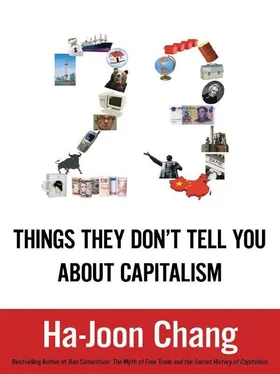This point is powerfully illustrated by the fact that even the notoriously racist apartheid regime in South Africa had to designate the Japanese ‘honorary whites’. There was no way the Japanese executives running the local Toyota and Nissan factories could go and live in townships like Soweto, where non-whites were forced to live under apartheid law. Therefore, the white-supremacist South Africans had to swallow their pride and pretend that the Japanese were whites, if they wanted to drive around in Japanese cars. That is the power of the market.
The power of the market as a ‘leveller’ is more widespread than we think. As the British writer Alan Bennett’s play-turned-movie, History Boys , so poignantly shows, students from disadvantaged groups tend to lack intellectual and social confidence and are thus disadvantaged in getting into elite universities – and by extension, better-paying jobs. Obviously, universities do not have to respond to market pressures as quickly as firms have to. However, if some university consistently discriminated against ethnic minorities or working-class kids and took in only people from the ‘right’ backgrounds despite their inferior quality, potential employers would come to prefer the graduates from non-racist universities. The narrow-minded university, if it is to recruit the best possible students, would have to abandon its prejudices sooner or later.
Given all this, it is tempting to argue that, once you ensure equality of opportunity, free from any formal discrimination other than according to merit, the market will eliminate any residual prejudices through the competitive mechanism. However, this is only the start. A lot more has to be done to build a genuinely fair society.
The end of apartheid and the cappuccino society
While there are still too many people with prejudices against certain races, poor people, lower castes and women, today few would openly object to the principle of equality of opportunity. But at this point, opinions divide sharply. Some argue that equality should end with that of opportunity. Others, including myself, believe that it is not enough to have mere formal equality of opportunity.
Free-market economists warn that, if we try to equalize the outcomes of people’s actions and not just their opportunities to take certain actions, that will create huge disincentives against hard work and innovation. Would you work hard if you knew that, whatever you do, you will get paid the same as the next guy who is goofing off? Isn’t that exactly why the Chinese agricultural communes under Mao Zedong were such failures? If you tax the rich disproportionately and use the proceeds to finance the welfare state, won’t the rich lose the incentive to create wealth, while the poor lose the incentive to work, as they are guaranteed a minimum standard of living whether they work hard or not – or whether they work at all? ( See Thing 21 .) This way, free-market economists argue, everyone becomes worse off by the attempt to reduce inequality of outcome ( see Thing 13 ).
It is absolutely true that excessive attempts to equalize outcomes – say, the Maoist commune, where there was virtually no link between someone’s effort and the reward that she got – will have an adverse impact on people’s work effort. It is also unfair. But I believe that a certain degree of equalization of outcomes is necessary, if we are to build a genuinely fair society.
The point is that, in order to benefit from the equal opportunities provided to them, people require the capabilities to make use of them. It is no use that black South Africans now have the same opportunities as whites to get a highly paid job, if they do not have the education to qualify for those jobs. It is no good that blacks now can enter better (former white-only) universities, if they still have to attend poorly funded schools with underqualified teachers, some of whom can barely read and write themselves.
For most black kids in South Africa, the newly acquired equality of opportunity to enter good universities does not mean that they can attend such universities. Their schools are still poor and poorly run. It is not as if their underqualified teachers have suddenly become smart with the end of apartheid. Their parents are still unemployed (even the official unemployment rate, which vastly underestimates true unemployment in a developing country, is, at 26–28 per cent, one of the highest in the world). For them, the right to enter better universities is pie in the sky. For this reason, post-apartheid South Africa has turned into what some South Africans call a ‘cappuccino society’: a mass of brown at the bottom, a thin layer of white froth above it, and a sprinkling of cocoa at the top.
Now, free-market economists will tell you that those who do not have the education, the determination and the entrepreneurial energy to take advantage of market opportunities have only themselves to blame. Why should people who have worked hard and obtained a university degree against all odds be rewarded in the same way as someone, coming from the same poor background, who goes into a life of petty crime?
This argument is correct. We cannot, and should not, explain someone’s performance only by the environment in which he has grown up. Individuals do have responsibilities for what they have made out of their lives.
However, while correct, this argument is only part of the story. Individuals are not born into a vacuum. The socio-economic environment they operate in puts serious restrictions on what they can do. Or even on what they want to do. Your environment can make you give up certain things even without trying. For example, many academically talented British working-class children do not even try to go to universities because universities are ‘not for them’. This attitude is slowly changing, but I still remember seeing a BBC documentary in the late 1980s in which an old miner and his wife were criticizing one of their sons, who had gone to a university and become a teacher, as a ‘class traitor’.
While it is silly to blame everything on the socio-economic environment, it is equally unacceptable to believe that people can achieve anything if they only ‘believe in themselves’ and try hard enough, as Hollywood movies love to tell you. Equality of opportunity is meaningless for those who do not have the capabilities to take advantage of it.
The curious case of Alejandro Toledo
Today, no country deliberately keeps poor children from going to school, but many children in poor countries cannot go to school because they do not have the money to pay for the tuition. Moreover, even in countries with free public education, poor children are bound to perform poorly in school, whatever their innate ability may be. Some of them go hungry at home and also skip lunch at school. This makes it impossible for them to concentrate, with predictable results for their academic performance. In extreme cases, their intellectual development may have already been stunted because of a lack of food in their early years. These kids may also suffer more frequently from illness, which makes them skip school more often. If their parents are illiterate and/or have to work long hours, children will have no one to help them with their homework, while middle-class children will be helped by their parents and rich kids may have private tutors. Helped or not, they may not even have enough time for homework, if they have to take care of younger siblings or tend the family goats.
Given all this, as far as we accept that we should not punish children for having poor parents, we should take action to ensure that all children have some minimum amounts of food, healthcare and help with their homework. Much of this can be provided through public policy, as happens in some countries – free school lunches, vaccinations, basic health checks and some help with homework after school by teachers or tutors hired by the school. However, some of this still needs to be provided at home. Schools can provide only so much.
Читать дальше






![Ally Carter - [Gallagher Girls 01] I'd Tell You I Love You But Then I'd Have to Kill You](/books/262179/ally-carter-gallagher-girls-01-i-d-tell-you-i-lo-thumb.webp)





